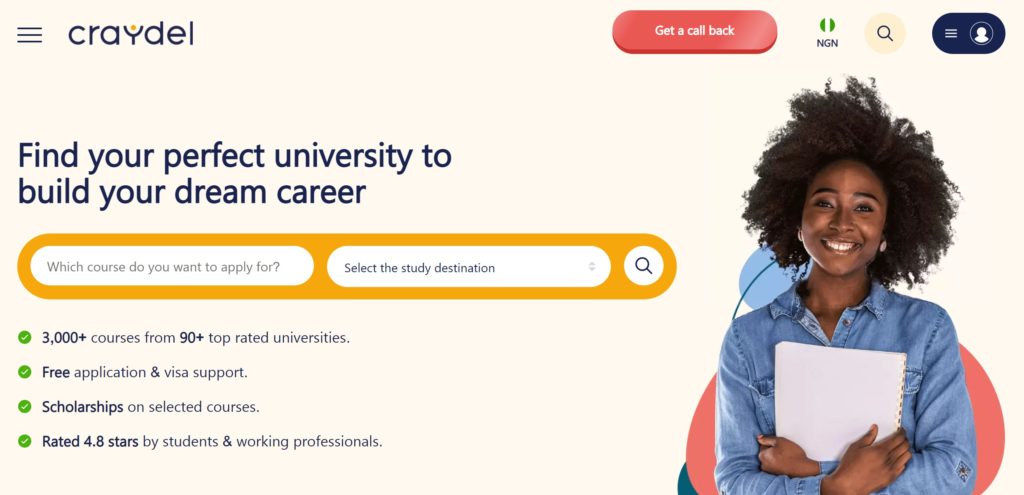In Africa, the path to making higher education choices is cumbersome and fraught with misinformation. Majority of students end up studying a course they don’t like or ones they aren’t confident about, and that affects their career options upon graduation.
This problem is prevalent because there is no central place for students to compare their options, receive unbiased guidance, and seamlessly apply online. Despite this, over 15 million African students still enroll in higher education annually.
Craydel, a Kenya-based edtech startup founded in March 2021 by Manish Sardana (CEO), John Nguru (CTO), and Shayne Aman Premji (CFO), is changing the narrative of how African students access post-secondary education by creating a seamless applications processing experience through its platform.

“An estimated $30 billion is spent every year on higher education in Africa. But the current student experience in accessing higher education is abysmal. There is no aggregation of choices, and decision making is influenced by biases and misinformation,” said Sardana.
Craydel is Africa’s first online higher education platform that enables students and working professionals to discover, compare and apply to higher education institutions in Africa and abroad.
How does Craydel work?
Before Craydel, students either went through the trouble of applying themselves or paying an education agency to help them through the process. But with these two methods, students were either faced with too much information and ended up abandoning the process or misapplying; or paying agents—who are often unreliable—very ridiculous amounts of money.
Craydel, on the other hand, provides a digital end-to-end higher education service. Its service spans from the point of students choosing schools, programmes and courses to the application and admission stages. The company also provides visa support for those who choose to study abroad, all for free.
According to the company’s website, it also provides students with Career Match Assessment (CMA), which uses career development models, psychometrics and advanced machine learning to give users confidence in making career decisions. For $20, students who don’t have courses they want to study can take the assessment, and then get matched with suitable courses and the best schools offering them.

The company only charges for CMA; everything else is free. Users won’t pay a dime if they already know what they want to study.
So, how does the company then make money? According to Premji, for every successful admission a partnered institution gets, the company gets a commission in return. Although the company is looking at other sources of revenue in the future, they are somewhat certain that this model is sustainable enough that they won’t ever have to charge users for their services.
Traction and growth
Craydel is already in partnership with 90 institutions across Canada, the UK and US, Ireland, and African countries like Malawi and Kenya. There are over 3,000 courses—spread across undergraduate and postgraduate programmes—available to choose from.
Besides formal education, the platform also has some top vocational institutions where students can enroll for either diploma or certification programmes in digital marketing, animation, music production, and more.
According to Craydel’s CFO, Premji, the company adds 50 new courses every day; that means, before the end of the year, the platform will have added about 1,750 more courses.
“Whether it is an online MBA, a degree in medicine, a diploma in animation or a certificate in culinary arts, we are building the largest inventory of quality higher education programmes for students and working professionals in Africa. And we are powering this with an AI-driven search-and-recommendation engine that matches a student’s interests, aptitude, grades and budget to their best-fit programs and institutions,” said Premji.
Within barely eight months of launching, the business has experienced some incredible growth that has attracted top local and international angel and institutional investors. Last Wednesday, Craydel announced a $1 million pre-seed raise.
The investment was led by Enza Capital and saw participation from BriteGaze, Future of Learning Fund (Africa-focused edtech investor), Bisk Ventures, Tekton Ventures, Kenya-based Chandaria Capital, and Nigeria-based LoftyInc Afropreneurs Fund.
Speaking on its investment in Craydel, Mike Mompi, Managing Partner at Enza Capital—who will be joining Craydel’s Board of Directors—said, “Craydel is building the rails to democratise access to higher education and to support millions of Africans up this curve. We are enthused to be backing Manish, John, Shayne and the Craydel team at this early stage as they build world-class tech and embark on this meaningful journey.”
These institutions were joined by a group of (undisclosed) strategic angel investors, including founders and top executives from some of Africa’s leading software-as-a-service (SaaS), e-commerce and education start-ups.
What’s next for the company?
Though the company is still at its early stage of building, its growth is expected to be expedited by this new capital as it is, according to Premji, a validation of the important solution the company has built.
The company plans to use the new investment to continuously improve its search-and-recommendation engine, enhance its proprietary online career resources and technology, and serve more students on the continent.
“It can be a challenge when students have too many options, but it becomes easier when their options are carefully curated by a super-smart AI-backed engine, according to their interests, aptitudes, grades, budgets and career aspirations. And that’s where we are going,” Premji told TechCabal.
Though the company is presently operating from Kenya, its platform can be accessed from anywhere in the world.



















